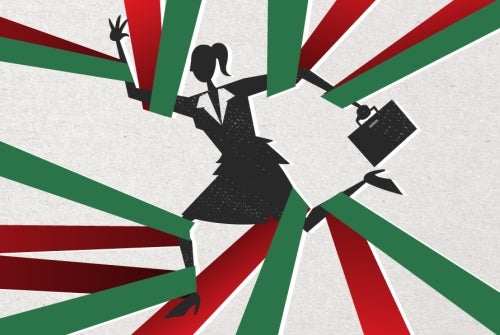This blog was produced in collaboration with
Raseef22.
 Jordan is at the bottom of the list when it comes to women’s economic participation , ranking 139 out of 142 countries. Gender activists say Jordan’s legislation, unfriendly work practices, and local customs are the reasons for this low ranking.
Jordan is at the bottom of the list when it comes to women’s economic participation , ranking 139 out of 142 countries. Gender activists say Jordan’s legislation, unfriendly work practices, and local customs are the reasons for this low ranking.
Tamador Azaizeh graduated in 2008 with a degree in chemical engineering. She lived in a village in Jordan’s Irbid province, where she found that with “the lack of safe public transportation and distance to any industrial establishment” it was impossible to find a good job. “I was unemployed for five years,” she said, “and, after getting married, I moved to the city of Irbid, where there were relatively more job opportunities. I applied for jobs in my field but was rejected. In general, companies want to hire either new graduates or people with experience.”
After continuing her job search, Azaizeh got a job as a math and science teacher in a private school. There she faced a new challenge; her salary was only JD 150 ($211) a month, well below the minimum wage in Jordan, which is JD 190 ($270) a month.
Azaizeh explained, “The owner of the school didn’t even pay the wage required by the labor law. Basically, he gave the teachers little choice: either to accept the job on his terms or to resign. And the violations were not limited to our salary, as they also included depriving us of social security, leave, and our workers’ rights.”
Hers is not an isolated case: Azaizeh said she and 14 of her colleagues have filed a grievance to the Ministry of Labor and a lawsuit against the school’s owner. She is active in a campaign called “Stand with the Teacher” aimed at raising awareness of the rights of women teachers and the need for a safe and just workplace.
Reem Aslan, a consultant for the International Labor Organization (ILO), said the difficulties faced by Azaizeh are not unique but are shared by many women. “Worse yet is that Jordan’s rate of economic participation of women has declined over the past two years ,” she added. The rate of women’s participation in the labor market in Jordan fell from 14.9% in 2009 to 13.2% in 2013, according to a study by the Higher Population Council (HPC) and the Jordanian National Commission for Women (JNCW).
Aslan said this decline was due to a number of factors, the most important, low wages—below the legal minimum in many cases—and the lack of a safe, reliable transport. The lack a work environment friendly to mothers, with access to child care facilities, also affects labor participation, as do social norms and the conflict between family and professional responsibilities.
The study shows a 12.3% gap in average wages between men and women in Jordan , rising to 17% in the private sector. The average wage for men is JD 403 a month, compared to JD 359 a month for women. There is also inequality in annual raises and promotions, and women do not receive some allowances.
A number of initiatives have been launched to encourage greater women’s participation in the labor force. “Stand with the Teacher,” the initiative in which Tamador Azaizeh is involved, is for fair wages for female teachers in the private sector. Another initiative, “Together We Arrive,” is for safe and reliable transport for female students and teachers, as surveys show 40% of women reluctant to work because of the lack of safe transportation .
A campaign to provide a more woman-friendly work environment, called “Sadaqa” (Friendliness), encourages women to work by providing child care during working hours. A study on women who have left the labor market, also published by the HPC, shows that 78% of women who do not work are married , and that one third of them have been married for less than two years.
The “Sadaqa” campaign, launched about five years ago, advocates the enforcement of Article 72 of the Jordanian Labor Law requiring organizations with over 20 women employees to provide day care facilities on their premises and cater to at least ten children under the age of four. According to founding member, Randa Naffa, the campaign helps working women to become more productive, something that should eventually enable them to reach policy making positions. Naffa said that while legislation requiring the provision of day care is on the books, it is not enforced.
Jordanian laws protect working women’s rights in terms of maternity leave, day care , and giving time for nursing babies. With these laws not strictly enforced, national legislation is also needed to prohibit discrimination between men and women in the workplace and ensure equal wages. Various types of non-traditional work, such as part-time work, telework, and flexible working hours, need to be expanded, too.
With more Jordanian women (87%) finishing secondary level education than men (74.3%), cultural change is also needed. “It’s strange that in a country where women have a higher rate of graduation from high school than men, women’s participation in the economy is among the lowest in the world,” said the ILO’s Aslan.
 Jordan is at the bottom of the list when it comes to women’s economic participation , ranking 139 out of 142 countries. Gender activists say Jordan’s legislation, unfriendly work practices, and local customs are the reasons for this low ranking.
Jordan is at the bottom of the list when it comes to women’s economic participation , ranking 139 out of 142 countries. Gender activists say Jordan’s legislation, unfriendly work practices, and local customs are the reasons for this low ranking.
Tamador Azaizeh graduated in 2008 with a degree in chemical engineering. She lived in a village in Jordan’s Irbid province, where she found that with “the lack of safe public transportation and distance to any industrial establishment” it was impossible to find a good job. “I was unemployed for five years,” she said, “and, after getting married, I moved to the city of Irbid, where there were relatively more job opportunities. I applied for jobs in my field but was rejected. In general, companies want to hire either new graduates or people with experience.”
After continuing her job search, Azaizeh got a job as a math and science teacher in a private school. There she faced a new challenge; her salary was only JD 150 ($211) a month, well below the minimum wage in Jordan, which is JD 190 ($270) a month.
Azaizeh explained, “The owner of the school didn’t even pay the wage required by the labor law. Basically, he gave the teachers little choice: either to accept the job on his terms or to resign. And the violations were not limited to our salary, as they also included depriving us of social security, leave, and our workers’ rights.”
Hers is not an isolated case: Azaizeh said she and 14 of her colleagues have filed a grievance to the Ministry of Labor and a lawsuit against the school’s owner. She is active in a campaign called “Stand with the Teacher” aimed at raising awareness of the rights of women teachers and the need for a safe and just workplace.
Reem Aslan, a consultant for the International Labor Organization (ILO), said the difficulties faced by Azaizeh are not unique but are shared by many women. “Worse yet is that Jordan’s rate of economic participation of women has declined over the past two years ,” she added. The rate of women’s participation in the labor market in Jordan fell from 14.9% in 2009 to 13.2% in 2013, according to a study by the Higher Population Council (HPC) and the Jordanian National Commission for Women (JNCW).
Aslan said this decline was due to a number of factors, the most important, low wages—below the legal minimum in many cases—and the lack of a safe, reliable transport. The lack a work environment friendly to mothers, with access to child care facilities, also affects labor participation, as do social norms and the conflict between family and professional responsibilities.
The study shows a 12.3% gap in average wages between men and women in Jordan , rising to 17% in the private sector. The average wage for men is JD 403 a month, compared to JD 359 a month for women. There is also inequality in annual raises and promotions, and women do not receive some allowances.
A number of initiatives have been launched to encourage greater women’s participation in the labor force. “Stand with the Teacher,” the initiative in which Tamador Azaizeh is involved, is for fair wages for female teachers in the private sector. Another initiative, “Together We Arrive,” is for safe and reliable transport for female students and teachers, as surveys show 40% of women reluctant to work because of the lack of safe transportation .
A campaign to provide a more woman-friendly work environment, called “Sadaqa” (Friendliness), encourages women to work by providing child care during working hours. A study on women who have left the labor market, also published by the HPC, shows that 78% of women who do not work are married , and that one third of them have been married for less than two years.
The “Sadaqa” campaign, launched about five years ago, advocates the enforcement of Article 72 of the Jordanian Labor Law requiring organizations with over 20 women employees to provide day care facilities on their premises and cater to at least ten children under the age of four. According to founding member, Randa Naffa, the campaign helps working women to become more productive, something that should eventually enable them to reach policy making positions. Naffa said that while legislation requiring the provision of day care is on the books, it is not enforced.
Jordanian laws protect working women’s rights in terms of maternity leave, day care , and giving time for nursing babies. With these laws not strictly enforced, national legislation is also needed to prohibit discrimination between men and women in the workplace and ensure equal wages. Various types of non-traditional work, such as part-time work, telework, and flexible working hours, need to be expanded, too.
With more Jordanian women (87%) finishing secondary level education than men (74.3%), cultural change is also needed. “It’s strange that in a country where women have a higher rate of graduation from high school than men, women’s participation in the economy is among the lowest in the world,” said the ILO’s Aslan.


Join the Conversation